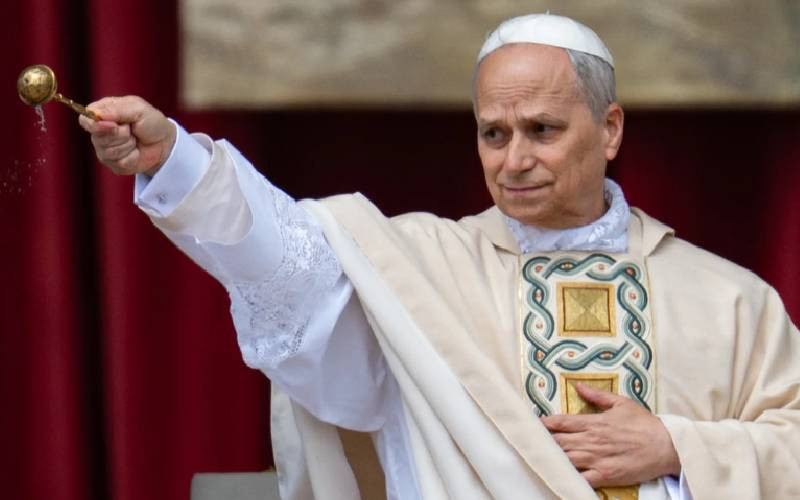Head of the Catholic Church, Pope Leo XIV, is poised to embark on his inaugural foreign trip next month to Turkey and Lebanon, the Vatican has reported.
The pilgrimage is a symbolic gesture to both Christian and Muslim communities and will fulfil a journey his predecessor, Pope Francis, had planned.
The Vatican, while confirming the trip, stated that Pope Leo will visit Turkey from November 27 to 30, and Lebanon from November 30, to December 2.
The Turkish itinerary includes a pilgrimage to Iznik, marking the 1,700th anniversary of the Council of Nicaea, the first ecumenical council.
Follow The Standard
channel
on WhatsApp
The anniversary holds crucial importance for Catholic-Orthodox relations. Pope Francis had intended to mark it with his own Turkish trip in May, after being invited by Patriarch Bartholomew I, the Orthodox leader.
Following Francis’s death in April, Leo expressed his clear intention to fulfil his predecessor’s plans.
The trip will give the first American pope a chance to speak broadly about peace in the Middle East and the plight of Christians in the region.
Like Francis, Leo has consistently called for peace and dialogue in the Middle East, especially as Israel’s offensive continues in Gaza.
The last pope to visit Lebanon was Pope Benedict XVI in September 2012, in what became the final foreign trip of his papacy. Francis had long hoped to visit Lebanon, but the country’s political and economic instability prevented a visit during his lifetime.
The Mediterranean nation of around six million people, including more than one million Syrian and Palestinian refugees, has the largest percentage of Christians in the Middle East and is the only Arab country with a Christian head of state.
However, the Vatican fears the country’s instability poses a serious threat to the continued presence of its Christian community, considered a vital bulwark for the Church in the region.
Lebanon is currently struggling to recover from years of economic crisis and a bruising war between Israel and the Lebanese militant group Hezbollah, which ended with a US- and France-brokered ceasefire in November.
The formation of a new, reformist government in November ended a two-year political vacuum and raised hopes for recovery, but the situation remains tense.
Lebanese President Joseph Aoun announced the trip on X, but provided only the dates. The Vatican said the full itinerary would be released at a later date.
Israel continues to occupy five strategic points on the Lebanese side of the border and carries out near-daily airstrikes, which it says are intended to prevent Hezbollah from regrouping.
Hezbollah is under growing domestic and international pressure to surrender its remaining arsenal but has refused to do so until Israel withdraws and halts its airstrikes. There are fears of civil conflict if Lebanese authorities attempt to forcibly disarm the group.
Follow The Standard
channel
on WhatsApp
Head of the Catholic Church, Pope Leo XIV, is poised to embark on his inaugural foreign trip next month to Turkey and Lebanon, the Vatican has reported.
The pilgrimage is a symbolic gesture to both Christian and Muslim communities and will fulfil a journey his predecessor, Pope Francis, had planned.
The Vatican, while confirming the trip, stated that Pope Leo will visit Turkey from November 27 to 30, and Lebanon from November 30, to December 2.
The Turkish itinerary includes a pilgrimage to Iznik, marking the 1,700th anniversary of the Council of Nicaea, the first ecumenical council.
Follow The Standard
channel
on WhatsApp
The anniversary holds crucial importance for Catholic-Orthodox relations. Pope Francis had intended to mark it with his own Turkish trip in May, after being invited by Patriarch Bartholomew I, the Orthodox leader.
Following Francis’s death in April, Leo expressed his clear intention to fulfil his predecessor’s plans.
The trip will give the first American pope a chance to speak broadly about peace in the Middle East and the plight of Christians in the region.
Like Francis, Leo has consistently called for peace and dialogue in the Middle East, especially as Israel’s offensive continues in Gaza.
The last pope to visit Lebanon was Pope Benedict XVI in September 2012, in what became the final foreign trip of his papacy. Francis had long hoped to visit Lebanon, but the country’s political and economic instability prevented a visit during his lifetime.
The Mediterranean nation of around six million people, including more than one million Syrian and Palestinian refugees, has the largest percentage of Christians in the Middle East and is the only Arab country with a Christian head of state.
However, the Vatican fears the country’s instability poses a serious threat to the continued presence of its Christian community, considered a vital bulwark for the Church in the region.
Lebanon is currently struggling to recover from years of economic crisis and a bruising war between Israel and the Lebanese militant group Hezbollah, which ended with a US- and France-brokered ceasefire in November.
The formation of a new, reformist government in November ended a two-year political vacuum and raised hopes for recovery, but the situation remains tense.
Lebanese President Joseph Aoun announced the trip on X, but provided only the dates. The Vatican said the full itinerary would be released at a later date.
Israel continues to occupy five strategic points on the Lebanese side of the border and carries out near-daily airstrikes, which it says are intended to prevent Hezbollah from regrouping.
Stay informed. Subscribe to our newsletter
Hezbollah is under growing domestic and international pressure to surrender its remaining arsenal but has refused to do so until Israel withdraws and halts its airstrikes. There are fears of civil conflict if Lebanese authorities attempt to forcibly disarm the group.
Follow The Standard
channel
on WhatsApp
By Philip Mwakio


